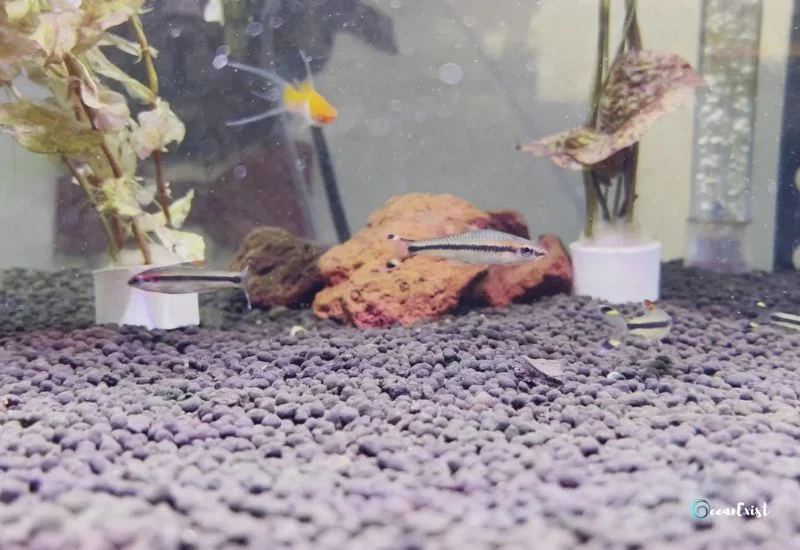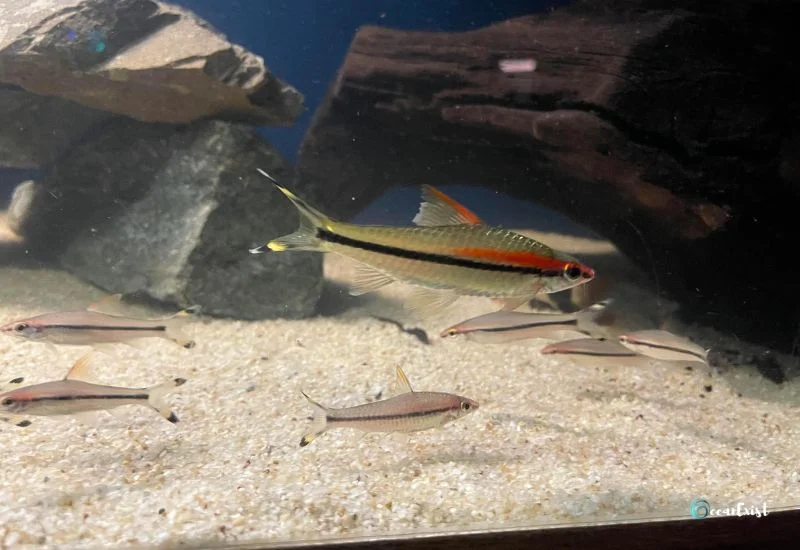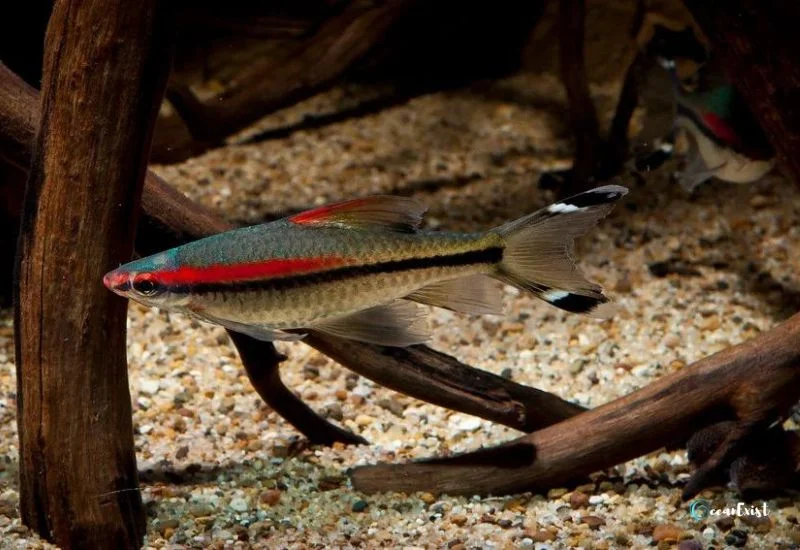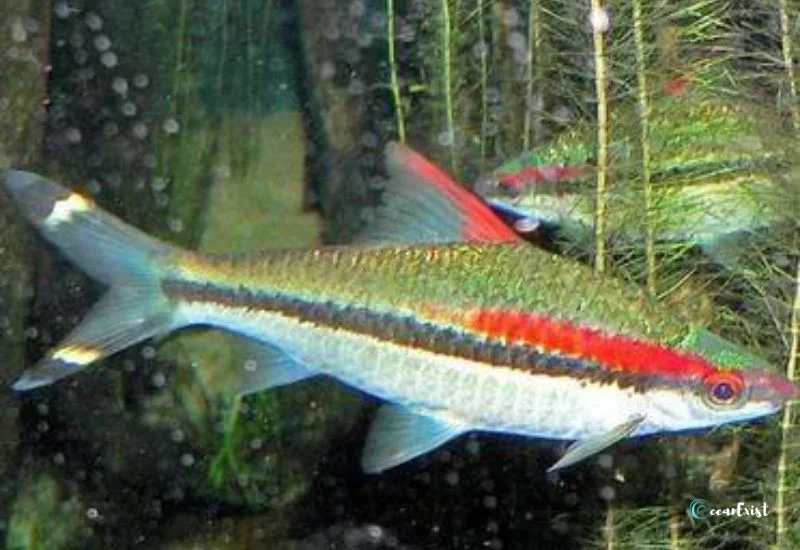Roseline Sharks are also known as Denisonii Barb or Redline Torpedo Sharks, which belong to the Minnow family and are mainly found in the western ghats (north-south range of hills in western India). Roseline shark is a vividly colored fish with a vibrant red, yellow, and black coloration.
Due to its fascinating colors and energetic and lovely movements in the tank, it is considered a favorite for aquariums.
This fish can grow up to 5 or 6 inches in length, which enhances its beauty and makes the aquarium environment lovely. But you should keep enough space in the aquariums. This fish requires a bigger swimming area to fulfill its natural movements. If they are provided with good water conditions and water quality, they can easily be tamed in the aquarium.
In this guide, We will explain the proper living environment for Denisonii Bar sharks, their physical size, their behaviors, diets, tank requirements, tank mates, and other characteristics associated with this fish.
Tank Size Requirements for Roseline Fish

Roseline sharks need a lot of aquarium area to allow them to move freely. The extra space will also allow other fish in the tank to live with them. For example, if We have a 55-gallon water tank that is 4 feet long, it can be a minimum suitable tank area for sharks to live in according to their lively nature.
Roseline sharks also grow, and they can be much bigger when they are mature. So, a bigger tank/home aquarium is always suitable to house them.
Roseline sharks are not habitual of living in confined areas. Roseline sharks get frustrated and try to harm themselves by hitting the pool walls in low-spaced pools.
Due to their lively nature, Roseline sharks may come out of the water. So, always install the aquarium lid properly. Always purchase a large-height aquarium with strong outer walls.
What is the average lifespan of Roseline sharks?
Denison Barbs (Roseline Sharks) have an average lifespan of almost 5-6 years.
If you provide a better living environment and protein-rich food, their lifespan will increase. Improper living conditions, such as temperature changes and poor water quality, may result in diseases in them.
What Do Roseline Sharks Eat?
Roseline sharks are omnivorous and eat a natural omnivorous diet, like all types of fish and shrimp. This species is usually fed on algae in aquatic areas, like algae found on the walls of the tank, but they also eat planta and other vegetables in the water.
If you are housing them in a captive area, make their food schedule for them. Their food may include frozen fish flakes and pellets.
While selecting food for Roseline sharks, keep in mind the nutrients they need to live a healthy life. Do not overfeed them to prevent any health and digestion issues, and always focus on feeding them nutrient-rich food. Some high nutrient-based foods include blanched vegetables or spirulina-based foods found in the freshwater.
Can Roseline Sharks Eat Other Fish?

Roseline sharks have a very friendly nature, and they try to live like a family of other aquatic species of their size. But sometimes, they can also attack the gills and eyes of smaller fish who try to be energetic and move quickly.
The Roseline sharks have a small jaw, which they use to prey on small-sized guppies and saltwater shrimps. As discussed above, they can also be involved in small fights, but they never intend to harm other fish or cause any injury.
Small fish may get frightened by these sharks like fish because they possess the same speedy and energetic nature. But, You should carefully house them with tiny fish. These fish have good bonds with medium-sized fish as there are fewer chances of any harm.
What Are Water Parameters For Housing Roseline Sharks?
You must provide highly oxygenated water to Denison Barbs (Roseline Sharks) as they are habitual of living in similar sea environments.
These fish have no strict requirements for certain water conditions. However, You should be aware of the range of water parameters to avoid a non-suitable living environment.
Please follow the following water parameters to provide a better living environment for Roseline Sharks.
- Water hardness: 5 to 25 dGH
- Water temperature: 60°F to 77°F
- pH levels: 6.6 to 7.8.
You can buy a water testing kit to check all these parameters and measurements. Make sure to check all these parameters more often to ensure a suitable and healthy environment for these fish.
Are Roseline Sharks Aggressive?
Roseline sharks are not very aggressive, and they like to live in a family manner with their own species. They cannot live without their co-partners or their lookalike fish.
These fish are territorial, and they have the nature of possessing the place where they live. So, do not bring a solo Denisonii Barb, and always keep 4-6 of them to provide them with their natural habitat.
Roseline sharks have the nature to show dominance over their female Roseline sharks.
Do not overcrowd them in the same pool, and do not bring other fish outside of their species.
How Should You Setup Tank From Inside?
The outer environment in the pool plays a crucial role in providing a healthy life. If parameters like temperature, lighting, or decor change, discoloration in these fish may appear.
We have devised the following decor plan for housing Roseline sharks in your home aquarium.
- Add some natural plants and other things that provide vegetation in the tank. Choose plants such as Anubias and Java Fern. They will help provide a friendly and natural habitat for these fish.
- Spread some pebbles or tiny stones in the lower layer of the tank. Make sure not to put anything with sharp edges in the tank to avoid injury to the fish.
- Now, make a smooth layer of sand or fine gravel to make it look more beautiful over the layer of stones.
- Roseline sharks need some privacy. So, you will need to build a tiny private spot for them to hide when they are in an aggressive mood. We can build this spot in the pool with the help of small pebbles and other decor items.
- Always build a strong filtration system to provide them with a good flow of oxygen. Submersible jets will help create a powerful oxygen flow with good outlet pressure. You can fit them along the length of the tank to provide them with their natural habitat, having good oxygenated water with good water flow,
What Are the Best Tank Mates for Roseline Sharks?
The best tank mates for Roseline sharks are fish that are medium-sized, energetic, active swimmers and possess the same friendly nature as Betta fish and Cherry Barbs.
If there are varied types of species in the same pool, be careful not to add fish of violent species with Roseline sharks such as Red Tail Sharks. These fish have a much more aggressive nature and tend to injure other fish with their large trailing gills like Bettas.
Do not house fish that have an opposite nature to Roseline sharks, like the fish that are naturally slow movers and slow swimmers. Roseline sharks may get stressed with their nature and may get involved in fights with them, causing them minor injuries.
Baby shrimps are the best example of slow natural behavior and swimming style. Roseline sharks will likely have a fight with them, and they may eat these small shrimps.
Roseline Sharks Breeding
You should provide them with good water conditions and suitable hidden spots in the tank for breeding.
In the whole breeding process, do not forget regular water changes and maintenance and periodic filtration changes to keep better water quality.
Common Health Issues Causes and Care Tips For Roseline Sharks?

Roseline sharks may suffer from health issues from the following causes.
- Change in Temperature
- Changes in water ph
- Poor water quality
- Disturbance in water flow due to an unbalanced oxygenated system
- Non-availability of hidden spots for their privacy
If they suffer from any health issue and feel low in energy and are found hidden in the tank, you must apply proper medications and health techniques for them to cure.
Potential Diseases Associated with Roseline Sharks
Denison Barbs may get one common disease of ich. They are very sensitive to ich. In this disease, the fish’s body is covered in small white spots.
Roseline sharks usually get ill when they don’t feel their natural habitat. This is usually due to non-pristine water conditions.
Always pick up leftover food and clean gravel in the pool to maintain optimal water conditions.
Conclusion
In conclusion, if you can provide better water conditions, optimal temperature, and a well-oxygenated system, Roseline sharks will not be very difficult to house in domestic aquariums.
Feed them highly nutritious food for their better physical health and growth. Good water conditions and a healthy natural diet will also encourage them to breed.
Roseline sharks are not prone to diseases, but poor water conditions may lead them to a common disease called ich. If you are looking for a fish with beautiful coloring and active natural behavior to brighten the aquarium, Betta Fish are the best choice.
